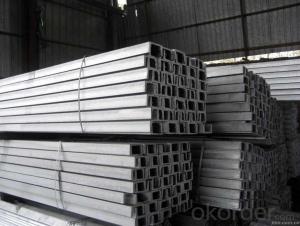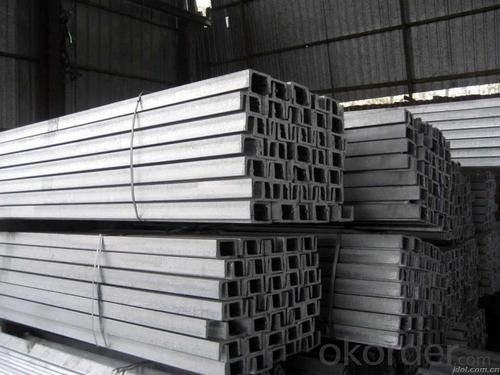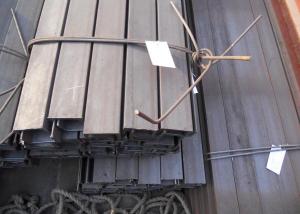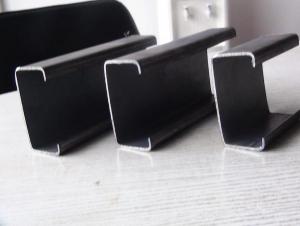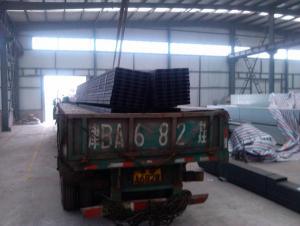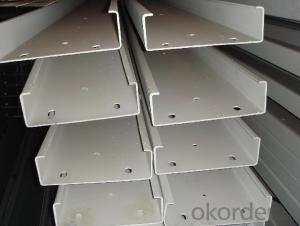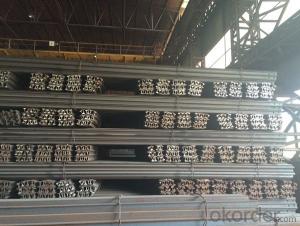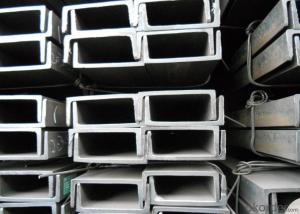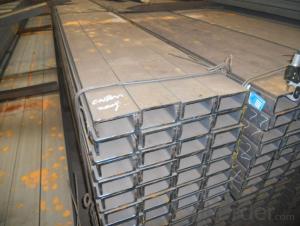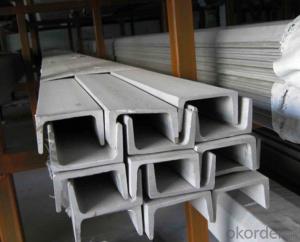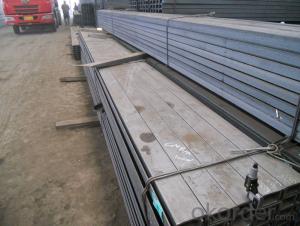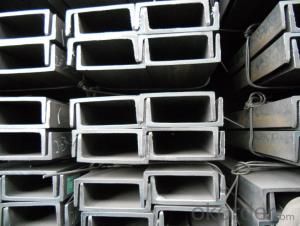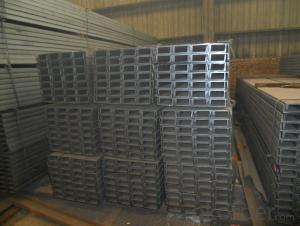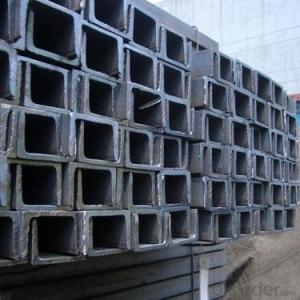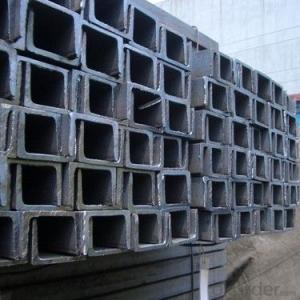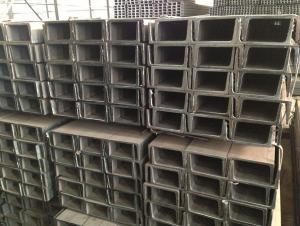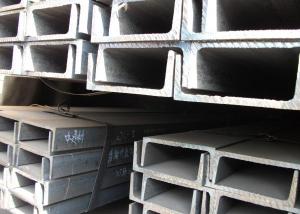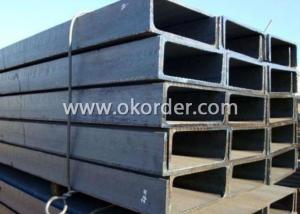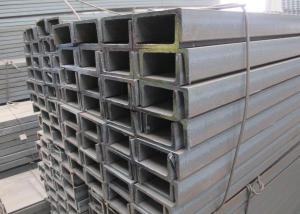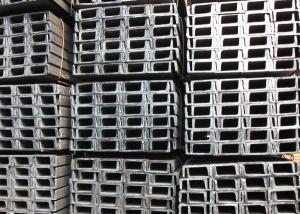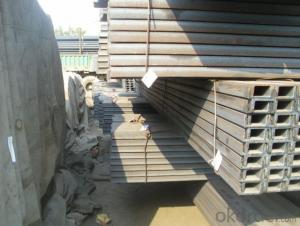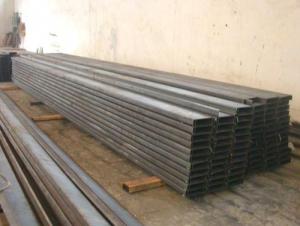JIS SS400 Steel Channel with High Quality 50mm
- Loading Port:
- Tianjin
- Payment Terms:
- TT OR LC
- Min Order Qty:
- 25 m.t
- Supply Capability:
- 10000 m.t/month
OKorder Service Pledge
OKorder Financial Service
You Might Also Like
JIS SS400 Steel Channel with High Quality 50mm
Product Description:
Standard: JIS
Material: SS400
Length: 6m, 12m
Size:
Size (mm) | Mass (Kg/m) |
50*25*3.0 | 2.37 |
Package & Delivery of JIS SS400 Steel Channel with High Quality 50mm:
1.The hot rolled channel steel will be packed in bundle with steel wire at each end of every bundle and color marking in order to help the customer to recognize his goods more easily at sight.
2. And the hot rolled channel steel could be loaded into 20ft or 40ft container, or by bulk cargo.If the weight of each bundle reaches more than 3.5 mt, the loading by break bulk cargo should be choosed.When the weight of each bundle reaches less than 3mt, the loading by container should be choosed.
3.As for the transportaion from mill to loading port, the truck will be usually used. And the maximum quantity for each truck is 40mt.
4.All in all, we could do in accordance with customer's request.
Production Flow of JIS SS400 Steel Channel with High Quality 50mm:
1.The steel billet shall be heated in the high temperature furnace.
2. The heated steel billet shall be rolled five to nine times with the aim of shaping the general figure of steel u channel.
3. The rolled steel channel should be put onto the cooling bed to make the temperature low.
4. The JIS Channel should be straighted on the straightener.
5. The straighted steel u channel will be cut into meters by saw, as per customer's requirements.
6. At the last part of production, the channel steel must be tested in order to confirm that the finished products are completely free from crack, pore, slag, scab or fold on the surface.
FAQ:
Q1: Why buy Materials & Equipment from OKorder.com?
A1: All products offered byOKorder.com are carefully selected from China's most reliable manufacturing enterprises. Through its ISO certifications, OKorder.com adheres to the highest standards and a commitment to supply chain safety and customer satisfaction.
Q2: How do we guarantee the quality of our products?
A2: We have established an advanced quality management system which conducts strict quality tests at every step, from raw materials to the final product. At the same time, we provide extensive follow-up service assurances as required.
Q3: How soon can we receive the product after purchase?
A3: Within three days of placing an order, we will arrange production. The shipping date is dependent upon the quatity, how many sizes you want and the plan of production, but is typically 1 month to 2 month days from the beginning of production.
Images of JIS SS400 Steel Channel with High Quality 50mm:
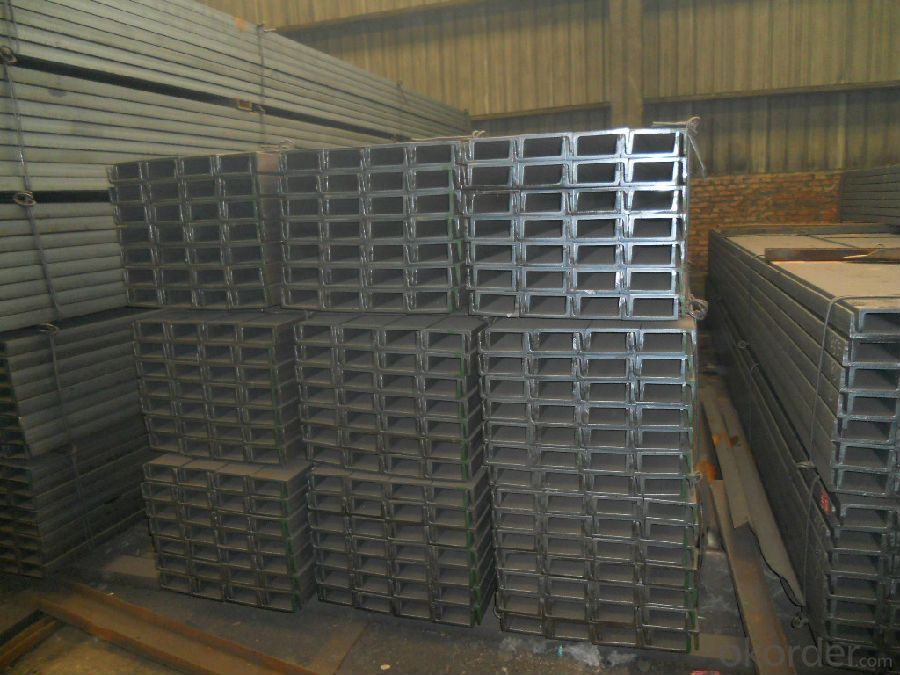
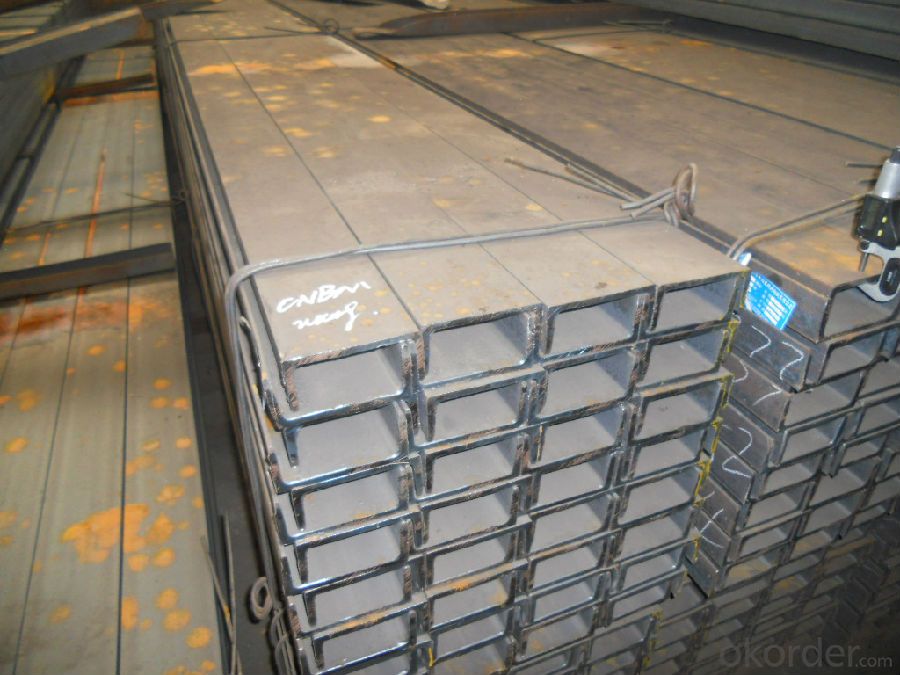
*If you would like to get our price, please inform us the size, standard/material and quantity. Thank you very much for your attention.
- Q: How do steel channels contribute to the overall thermal insulation of a structure?
- The overall thermal insulation of a structure is not directly influenced by steel channels. Nevertheless, these channels can have a role in supporting and securing the insulation materials used for thermal insulation. Typically, insulation materials like foam boards or fiberglass are installed between the structural framing members of a building to decrease heat transfer. As part of the structural framework, steel channels can provide the necessary support for these insulation materials. Steel channels aid in preventing any movement or displacement of the insulation materials, which could compromise their effectiveness. Moreover, they can act as a barrier, safeguarding the insulation from compression or damage during construction or over time. Additionally, steel channels have the ability to create airtight seals around the edges of insulation materials. This helps to minimize air leakage and improve the overall thermal performance of the structure. To summarize, although steel channels do not contribute directly to thermal insulation, they are crucial in supporting and securing insulation materials, ensuring their effectiveness, and enhancing the overall thermal insulation of a structure.
- Q: Are steel channels suitable for use in the construction of equipment frames?
- Yes, steel channels are suitable for use in the construction of equipment frames. Steel channels offer excellent strength, durability, and stability, making them ideal for supporting heavy loads and providing structural integrity to equipment frames. Additionally, steel channels can be easily customized and fabricated to meet specific design requirements, ensuring a precise fit for equipment components. Overall, steel channels are a reliable choice for constructing equipment frames due to their strength, versatility, and ability to withstand harsh environments.
- Q: How do steel channels contribute to the structural integrity of a building?
- Steel channels contribute to the structural integrity of a building in several ways. Firstly, they provide additional support and reinforcement to the structural framework, enhancing its overall strength and stability. Secondly, steel channels help distribute the load evenly across the building, reducing the risk of structural failure due to uneven weight distribution. Additionally, steel channels are resistant to bending and twisting forces, making them ideal for withstanding high-pressure and seismic activities. Overall, steel channels play a crucial role in improving the durability and safety of a building's structure.
- Q: How do steel channels contribute to the sustainability of a building?
- Steel channels contribute to the sustainability of a building in several ways. Firstly, steel channels are made from recycled steel, which reduces the demand for new raw materials and minimizes the environmental impact of mining and extraction processes. By utilizing recycled steel, the carbon footprint of a building is significantly reduced as compared to using other traditional construction materials. Additionally, steel channels have a long lifespan and are highly durable. They are resistant to corrosion, fire, and pests, which means that they require minimal maintenance over the lifetime of a building. This durability reduces the need for frequent replacements or repairs, thereby saving resources and reducing waste. Furthermore, steel channels offer design flexibility and can be easily fabricated and assembled, allowing for efficient construction processes. This reduces construction time and energy consumption, leading to lower costs and reduced environmental impact. Moreover, steel channels are lightweight compared to other building materials, making them easier to transport and handle. This reduces fuel consumption during transportation and contributes to a more sustainable supply chain. Lastly, steel channels can be recycled at the end of their life cycle, further reducing waste and conserving resources. The recycled steel can be used to manufacture new steel products, creating a closed-loop system that minimizes the need for new extraction and production. In conclusion, steel channels contribute to the sustainability of a building through their use of recycled materials, long lifespan and durability, design flexibility, lightweight nature, and recyclability. Their environmental benefits make them an eco-friendly choice for construction, helping to reduce the overall environmental impact of buildings and promote a more sustainable future.
- Q: Can steel channels be used in the construction of mezzanine floors?
- Yes, steel channels can be used in the construction of mezzanine floors. Steel channels are commonly used in construction for their strength and durability. Mezzanine floors are typically added to existing buildings to create additional space and are often used in industrial and commercial settings. Steel channels provide structural support and can be used as beams or joists in mezzanine floor construction. They are able to withstand heavy loads and provide a stable and secure platform for various purposes, such as storage, offices, or additional workspace. Additionally, steel channels can be customized to meet specific design and structural requirements, making them a versatile choice for mezzanine floor construction.
- Q: What are the different weight classifications for steel channels?
- Steel channels are categorized based on their weight per linear foot, which includes lightweight, medium weight, and heavy weight classifications. Lightweight steel channels typically weigh between 1.0 to 6.0 pounds per linear foot. These channels are commonly utilized in applications where strength is not the primary consideration and where the load requirements are relatively lower, such as in decorative or non-structural uses. Medium weight steel channels have a weight per linear foot ranging from 6.1 to 16.0 pounds. These channels are frequently employed in structural applications where there is a need for moderate strength and load-bearing capacity, such as in building frames, supports, and bracing. Heavy weight steel channels weigh between 16.1 to 40.0 pounds per linear foot. These channels are specifically designed to provide maximum strength and load-bearing capacity, making them ideal for heavy-duty structural applications like industrial buildings, bridges, and infrastructure projects. It should be noted that the weight classifications for steel channels can vary depending on the specific standards and specifications established by different countries and organizations.
- Q: Are steel channels available in non-standard sizes?
- Non-standard sizes of steel channels can indeed be found. Although industry standards dictate specific dimensions and weight requirements for standard steel channels, there are multiple avenues for acquiring non-standard sizes. Steel manufacturers and metalworking shops offer custom fabrication services that cater to specific size specifications. These custom channels can be crafted with distinct dimensions, lengths, and cross-sectional shapes, tailored to meet the precise demands of a particular project or application. To ensure the production of a customized steel channel, it is crucial to effectively communicate the desired non-standard size to the manufacturer or supplier.
- Q: Can steel channels be used in bridges and flyovers?
- Yes, steel channels can be used in bridges and flyovers. Steel channels are commonly used in the construction of bridges and flyovers due to their strength, durability, and versatility. They are often used as structural elements in the design of these structures to provide support and stability. Steel channels offer excellent load-bearing capacity, which is essential for withstanding the weight and forces exerted on bridges and flyovers. Additionally, steel channels can be easily fabricated and installed, making them a preferred choice in the construction industry. Overall, steel channels are widely utilized in bridges and flyovers to ensure the safety and longevity of these infrastructure projects.
- Q: Can steel channels be used in solar panel installations?
- Yes, steel channels can be used in solar panel installations. Steel channels, also known as steel C channels or steel U channels, are commonly used in construction and industrial applications for their strength, durability, and versatility. When it comes to solar panel installations, steel channels can be used as support structures for mounting solar panels on rooftops or in ground-mounted systems. Steel channels provide a stable and robust framework that can withstand the weight of solar panels and withstand various weather conditions. They can be easily customized and fabricated to meet specific installation requirements, such as the size and angle of the solar panels. Additionally, steel channels can be galvanized or coated to provide corrosion resistance, ensuring the longevity of the solar panel installation. Furthermore, steel channels offer flexibility in terms of design and layout. They can be easily integrated with other mounting systems and components, such as rails, brackets, and clamps, allowing for efficient and secure solar panel installations. The adaptability of steel channels makes them suitable for both residential and commercial solar panel projects. In conclusion, steel channels are a viable option for solar panel installations due to their strength, durability, versatility, and compatibility with other mounting systems. They provide a solid foundation for mounting solar panels, ensuring a stable and efficient solar energy system.
- Q: What are the applications of steel channels in the automotive industry?
- Steel channels are widely used in the automotive industry for various applications due to their strength, durability, and versatility. Some of the key applications of steel channels in the automotive industry are: 1. Vehicle frames: Steel channels are commonly used in the construction of vehicle frames due to their high strength-to-weight ratio. They provide structural support and rigidity to the overall frame, ensuring the safety and stability of the vehicle. 2. Chassis components: Steel channels are utilized in the manufacturing of various chassis components such as cross members, beams, and support brackets. These components help in maintaining the structural integrity of the vehicle, enhancing its overall performance and handling. 3. Bumpers: Steel channels are often used in the fabrication of bumpers to provide impact resistance and protect the vehicle from collisions. They offer the necessary strength and durability to withstand impacts, ensuring passenger safety. 4. Suspension systems: Steel channels are essential in the production of suspension systems, including control arms, torsion bars, and trailing arms. These components support the weight of the vehicle, absorb shocks, and provide stability, thereby enhancing the overall ride quality. 5. Exhaust systems: Steel channels are commonly used in the production of exhaust systems due to their ability to withstand high temperatures, corrosion, and vibrations. They are utilized in the fabrication of exhaust pipes, mufflers, and brackets, ensuring efficient and reliable exhaust performance. 6. Engine components: Steel channels find applications in various engine components such as engine mounts, brackets, and support structures. They provide the necessary strength and stability to support the engine, reducing vibrations and enhancing overall performance. 7. Body reinforcements: Steel channels are employed in reinforcing the vehicle's body structure, particularly in areas prone to impact or collision, such as door frames, pillars, and roof supports. This helps in improving the crashworthiness of the vehicle and protecting occupants during accidents. Overall, steel channels are integral to the automotive industry, playing a crucial role in enhancing the strength, durability, and safety of vehicles. Their applications range from supporting the vehicle's frame and chassis to various components such as bumpers, suspension systems, exhaust systems, and engine components.
Send your message to us
JIS SS400 Steel Channel with High Quality 50mm
- Loading Port:
- Tianjin
- Payment Terms:
- TT OR LC
- Min Order Qty:
- 25 m.t
- Supply Capability:
- 10000 m.t/month
OKorder Service Pledge
OKorder Financial Service
Similar products
Hot products
Hot Searches
Related keywords
